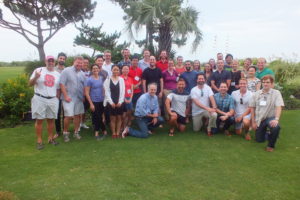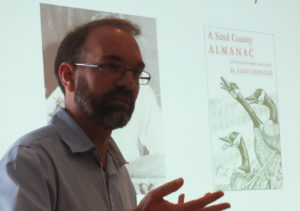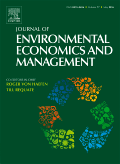Camp Resources 2017
2017 Camp Resources
The 24th annual Camp Resources Workshop was held August 7-8, 2017 in Wrightsville Beach, NC.
Below you will find links to Camp Resources twenty-five session presentations.
Archives for Camp Resources programming since 2000 can be found here.
Session 1: Research Sketches
- “The Other Shale Revolution: How the Fracking Boom Helped Indian Farmers” Faraz Usmani, Duke University
- “Integrating Econometric Land Use Models with Ecological Model to Guide Coastal Management and Planning” Laura Villegas, North Carolina State University
- “The Effect of Community-Based Natural Resource Management on Elephant Populations in Africa” Anomitro Chatterjee, Georgia State University
- “Non-Parametric Test of the Tragedy of the Commons” Yaqin Liu, Georgia State University
- “Bioeconomic Feedbacks in Microeconometric Models of Pest Control Decisions: An Application to Largescale Adoption of Bt Corn in the U.S” Serkan Aglasan, North Carolina State University
- “Unplugging the Rose-colored Bidirectional Charger: A Critical Assessment of Omitted Inputs in Electric Vehicle to Grid (V2G) Economic Analyses” Yosef Shirazi, University of Delaware
- “Does Increasing Energy Efficiency Result in Less Energy Security? An Analysis of Energy Efficient Upgrades and their Impact on Energy Assistance Programs” Amanda J. Harker Steele, University of Georgia
- “Valuing Ecological Changes in the Lake Michigan Recreational Fishery” Jennifer Raynor, University of Wisconsin-Madison
- “The Effect of the Number of Alternatives in a Choice Experiment Responses” Weizche Wang, Virginia Tech
- “Distributional Impacts of Dynamic Responses to Climate Policy in the Electricity Industry” Paige Weber, Yale University
Luncheon Presentation
- “The Environmental Turn in Natural Resource Economics: John Krutilla and ‘Conservation Reconsidered’” Spencer Banzhaf, Georgia State University
Session 2: Energy Prices
- “What Predicts Program Effectiveness? Knowing About it. Evidence from a Time-of-Use Electricity Pricing Experiment” Brian Prest, Duke University
- “Natural Gas Elasticities and Optimal Cost Recovery under Heterogeneity: Evidence from 300 Million Natural Gas Bills in California” Ed Rubin, University of California, Berkeley
- “Prices as Climate Policy: Assessing the Causal Effect of Electricity Prices on German Manufacturing Plants” Philipp Massier, University of Munster
Session 3: Land and Water
- “Environmental and Public Health Effects of Surface Coal Mining in Appalachia” Rose Mueller, University of Oregon
- “Forest Watershed Services on an Old Frontier in the Brazilian Amazon” Yu Wu, North Carolina State University
- “The Cost of Algae Contamination in Fresh Water Lakes: Identification of Environmental Quality Demand Functions Using Climate-Based Instruments” David Wolf, The Ohio State University
Session 4: Air
- “Heterogeneous Migration Costs and Higher Exposure to Air Pollution for Low Income Households” Sul-Ki Lee, Colorado School of Mines
- “Willingness to Pay for Clean Air in China” Ran Song, Harvard University
- “Legacies of Lead – Estimating Homebuyer Response to Lead Exposure” Nicholas Irwin, The Ohio State University
Session 5: Oceans
- “Empirical Structural Analysis of Value Generation in the Northeast Multispecies Sector Program” Anna Birkenback, Duke University
- “Assessing the Socioeconomic Impacts of Marine Protected Areas” David Gill, George Mason University/Conservation International
- “Valuation of Coral Reefs Using Choice Modelling and Contingent Valuation in Tobago” Jahson B. Alemu, The University of the West Indies
Session 6: Energy
- “Drivers of Coal Generator Retirements and their Impact on the Shifting Electricity Generation Portfolio in the U.S.” Becky Davis, University of Tennessee
- “Private and Social Costs of Electricity Generation: Evidence from India” Fiona Burlig, University of California, Berkeley
- “Transition to Clean Technology and Market Power in the Deregulated Electricity Industry: Machine Learning Methods for Estimating Dynamic Response and Causal Inference” Hyeongyul Roh, North Carolina State University
Camp Resources XXIV was made possible through the generous support of
Elsevier
Resources for the Future
Industrial Economics




